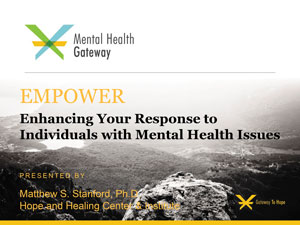
Tanya
Forum Replies Created
-
Hello Cynthia. Thank you for being a part of trying to end the stigma around mental health. I do believe that open communication and education are the first step in reaching that goal. In my own experience, words just aren’t enough. Even if you “provide proof or statistics” people are going to have their beliefs and that is ok. We cannot change people. I encourage you to read Grace for the Afflicted or Madness & Grace by Matthew S. Stanford, PhD. These books offer a clinical and biblical perspective on mental illness and the history of the church bridging the gap in the mental health community. Madness & Grace is also a foundational component to our Mental Health Coach training. These resources will give you a better understanding of the long standing stigma that mental health has carried and how other faith communities have broken that very same stigma within their communities. I look forward to hearing how God is going to use your ministry to break more stigmas in your community. Thank you for bridging the gap in the mental health community.
-
Tanya
Member06/30/2025 at 4:22 pm in reply to: The Stigma of Mental Health in Church! – Karen BeesonBeing in a faith community that understands mental health distress and creates a safe place for healing and growth is so important in the healing journey. I encourage you to read Madness & Grace by Matthew S. Stanford, PhD. It was the basis of our Mental Health Coach training course and it has great information on building a mental health ministry, success stories from other churches that have implemented a mental health ministry and how to cultivate a safe environment to do so. I look forward to hearing your success stories and how your MHC ministry has grown. Thank you for taking the first step in bridging the gap in the mental health community.
-
Tanya
Member06/30/2025 at 4:17 pm in reply to: De-escalation and Grounding: Tools to Recenter – Lauren LigonLauren, yes I agree that de-escalation and grounding techniques are vital in mental health coaching. I firmly believe in giving individuals the tools and the resources they need to understand their struggles, re-gain control of their emotions, and navigate those emotions in a healthy way. There are many forms of de-escalation and grounding techniques. What method has worked best for you?
-
Holly, no you cannot control the actions of others but you can control your response to others. Being able to understand that you are not responsible for how others respond is a big first step. I also believe that being able to have a list of providers or resources available is beneficial. While an individual may not be willing to accept help from you or your organization, they may be willing to accept a referral somewhere else.
-
Carla, I think having clear boundaries is important as a Mental Health Coach. It helps you to understand your limits as well as your role in the situation. While it is not your job to fix the individual, it is your role to help them on their mental health journey as much or as little as they will allow. Understanding their comfort level as well is important in respecting their boundaries. Once that level of respect and trust is built, the healing journey will progress. Thank you for taking the first step in bridging the mental health gap by becoming a mental health coach.
-
Tanya
Member06/26/2025 at 1:23 pm in reply to: What I can control as a Mental Health Coach – Jackie BuckleyJackie, I think one of the best resources you have to help clients build resilience, is the reImagine workbook provided in the Mental Health Coach training. The workbook is designed to treat the person as a whole and help provide them with the tools and resources needed on their mental health journey. As a Mental Health Coach, I suggest you familiarize yourself with it, in order to best utilize this workbook with your clients. If you are interested in learning more about how to use this material in a one-on-one setting or how to use it in a support group setting, check out this training for more information. Thank you for bridging the gap in the mental health community.
learn.gthu.org
Introduction to Support Group Training Many people find peer support a helpful tool that can aid in their recovery. Support groups are offered as a safe space where individuals can come together to share their stories, experiences, and lives in … Continue reading
-
Tanya
Member06/26/2025 at 10:58 am in reply to: Ending Silence on Mental Health in the Church – Delainey NealDelainey, I encourage you to explore the foundational book behind our Mental Health Coach Training by Dr. Matthew Stanford, Madness & Grace. It offers powerful insights and practical guidance for building a mental health ministry within your faith community and success stories from other organization just like yours. This book is filled with valuable information and resources that will help you in your journey. Thank you for taking the first step of becoming a Mental Health Coach and bridging the gap in the mental health community.
-
Tanya
Member06/26/2025 at 10:53 am in reply to: Creating a Culture of Compassion and Mental Health Stigma – Catalina MunozThank you for sharing Catalina. I loved how you said that your organization incorporates mental health check-ins. That is a great way to break the stigma surrounding mental health distress and encourages others to practice these simple check-ins. If we can teach individuals how to stop and listen to their bodies / mental health, they can seek treatment or support earlier. Thank you for serving with compassion and showing those struggling with mental health distress, Christ’s love. If GTHU can be of assistance to you in any way, please let us know. We look forward to hearing your testimonies of success in your community.
-
Tanya
Member06/26/2025 at 10:47 am in reply to: AK Church Discussion and Support Group – Amy KinneyHi Amy! I love your heart and passion for those struggling with mental health distress. If you haven’t already, I encourage you to check out the foundational book behind our Mental Health Coach Training, Madness & Grace. Written by Dr. Matthew Stanford, Madness & Grace offers powerful insights and practical guidance for supporting those in emotional and spiritual distress and even covers how to build a mental health ministry within your faith community. It has great success stories from churches that have launched their mental health ministry and the impact it has had on their church and community. I look forward to reading all of the wonderful stories and testimonies that will come from your ministry. Thank you for taking the step to bridge the gap in the mental health community.
-
Ann, I love this. Being a part of a team that can collectively work together to better serve your clients is a blessing. Advocating with love is a great way to break through the barriers most people have when seeking help. When individuals feel heard and validated, they are more likely to accept the resources provided to them. I would also suggest that if they have any difficulties accessing those referrals, that you encourage them to notify you. This allows you to gage which referrals work, the ones that are full or no longer accepting new referrals, or those that do not meet the needs of the individual. If you need access to any resources or referrals, feel free to check out our Mischer Behavioral Health Resource Center or The Hope Line at 832-831-7337. Both are great resources to us and share with your clients.
https://gthu.org/mischer-behavioral-health/
gthu.org
Mischer Behavioral Health Resource Center: Support & Tools
Discover resources to overcome behavioral health challenges and addiction. Chat with Grace, our friendly AI assistant, for personalized support and information.
-
Sondria, are you doing this as a part of the mental health ministry at your church or as a part of your personal ministry? It is always a great option to start within your own circle and begin to engage with individuals you already have a relationship with. As you begin to do that, you will find that they either know someone in need of resources or have a similar story to share. This is how we break the stigma surrounding mental health. Thank you for sharing and I cannot wait to hear all the wonderful stories your ministry will bear.
-
Here at GTHU we believe that every interaction with an individual is meaningful. It is so great to hear how you want your time spent with a client to be a comforting one for the individual. Sometimes walking in the door of an organization to get help is intimidating especially going through the intake process. Being able to compassionately respond and set the tone for future contact that individual will have with your organization is beneficial to one’s healing mental health journey. Thank you for your willingness to respond compassionately to those who are in mental health distress.
-
Cynthia, I agree that it is important to acknowledge the validity of their feelings in a moment of crisis so that they feel welcomed to open up honestly. In my experience as a Mental Health Coach, many times individuals come in with such hurt and baggage that the individuals puts walls up to protect themselves. Sometimes, genuinely apologizing for the hurt that they experienced can calm a person down. Many times, individuals just need someone to take accountability for the hurt caused. While you did not cause the hurt, having someone truly apologize can allow the individual to process their feelings and begin the healing journey. Thank you for the work that you do in the mental health community. I look forward to reading all the wonderful success stories you will have as a Mental Health Coach.
-
Tanya
Member06/17/2025 at 11:36 am in reply to: Dealing with an extremely upset person – Julia EberhardtJulia, these are all great de-escalation techniques. As humans, we have the tendency to feed off of each other’s energy. As a Mental Health Coach, you have to set the tone for the individual and practice these techniques so that you can remain calm in these tense situations. Many of the individuals you will coach, will suffer from some form of anxiety. Check out this Coach Call on Anxiety and the prevalence of anxiety across different age groups. Gain access to practical tools to help individuals manage anxiety in real-time.
https://learn.gthu.org/courses/mental-health-coach-call-anxiety/
-
Tracy, I recommend reading Dr. Matthew Stanford’s book called Madness & Grace. This book outlines how to start a mental health ministry in your faith community. GTHU offers monthly topical Lunch & Learns or Mental Health Coach Calls that will help provide additional education support. These trainings are free and provide information that will help you assist individuals in your community. For a list of referral contacts or easy-to-use access to a wide range of educational materials on addiction and behavioral health, including videos, trainings, events, downloadable resources, and quick assessments, as well as guided assistance to locate treatment and provider options, check out our Mischer Behavioral Health Resource Center at https://gthu.org/mischer-behavioral-health/
gthu.org
Mischer Behavioral Health Resource Center: Support & Tools
Discover resources to overcome behavioral health challenges and addiction. Chat with Grace, our friendly AI assistant, for personalized support and information.



